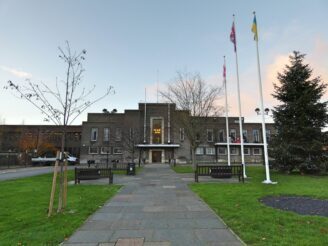
Havering Town Hall (credit: LDRS)
(Written by Local Democracy Reporter, Sebastian Mann)
The council’s race, equality, accessibility, diversity and inclusion (READI) report was compiled in 2021 and detailed a “disturbing” culture in the town hall.
The authority refused to make it public or let elected councillors read it, but was forced to release it after losing a string of legal appeals.
The 359-page dossier was published on Friday (29th November), less than two weeks after the council’s second and final appeal was denied.
Much of the report has been redacted, with sections greyed out or apparently removed. In some cases, entire responses have been replaced with question marks.
All names and job titles have also been removed, which the council says will prevent workers from being identified.
On the topic of how non-white members of staff feel about Havering’s approach to racial issues, the council said: “Staff reported a sense of expecting Havering to be ‘quite racist’ and some staff pointed out the complex political and racial history of the borough.
“Some colleagues reported that there is a perceived chilling effect of being as fulsome as the council might in consistently addressing racism and hate crime for fear of white British community response.”
Havering leader Ray Morgon initially told the Local Democracy Reporting Service (LDRS) it would not publish the dossier to protect the privacy of staff who took part, despite the council having been ordered to by a tribunal.
It spent a total of £3,670 to fight against the Romford Recorder, which had successfully lobbied for it to be released under the Freedom of Information Act.
In a public statement, council chief executive Andrew Blake-Herbert acknowledged the report “does not make for pleasant reading”.
However, he said it was “something we proactively asked for” in order for gain an “unfiltered” understanding of staff experiences. He added that it was “now a historic document”.
It had been compiled under the previous Conservative administration, a year before the Havering Residents Association took control in a since-dissolved coalition with Labour.
Blake-Herbert, who is not an elected member of the council, took on the top job in March 2016 and was in the role when the report was written.
In his statement, he attacked the Recorder for pushing the council to release the dossier.
He said: “From the relentless campaign the Recorder has run – in what they claimed to be was in the public interest – it seems they hold little regard for hard working council workers who keep the borough’s services running for our residents.
“Instead, they risk creating potential discord which in turn could inflame community tensions in return for a perceived ‘scoop’ and some hits on their website.”
A spokesperson for Newsquest, which publishes the Recorder, said: “Havering Council’s press release contains erroneous criticisms of the Romford Recorder, which it has refused to correct.
“We reject the suggestion that the press and public shouldn’t be allowed to scrutinise allegations of ‘disturbing’ institutional racism and sexism at a public-funded local authority.
“An independent court has agreed with us on three separate occasions.”
Despite the council’s initial efforts, the chief executive said further appeals were “unlikely to be successful” and would incur “significant costs”.
Blake-Herbert added: “As we strive to close a growing £75million budget gap, it is essential that we continue to be as prudent as possible.
“Let me be clear: this was never about winning or losing a legal battle but about keeping the promises made to us by the [Local Government Association] and to our staff.
“This was always about protecting our staff and therefore we have redacted the document by removing any personal details, including job titles and other information, which could identify individual staff members.”
Conservative councillor David Taylor told the Recorder: “It is in the public’s interest to understand what is happening inside the town hall and the report goes some way to revealing that.
“Whilst the cost of fighting the publication was, in the end, considered relatively low, I am concerned that Havering Council did not even allow councillors sight of the document until now.”
The document was published on the council’s website and can be read here.